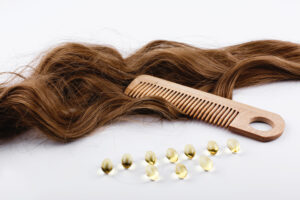
You can confirm a body-related problem through your unusual hair thinning along with increased hair shedding. Hair growth and loss can occur in women who have polycystic ovary syndrome (PCOS) which stands as one of the most frequent hormonal disorders affecting them. All women who have polycystic ovary syndrome demonstrate hair loss or not remains unclear. Does it weaken hair follicles? What are the preventive strategies for hair loss while understanding how the condition weakens hair follicles in patients who have this condition? This article provides complete information about how polycystic ovary affects hair loss through specific scientific treatments and control methods.
What is a polycystic ovary and how does it cause hair loss?
- Polycystic ovary syndrome (PCOS), a common hormonal disorder
Polycystic ovary syndrome (PCOS) affects the hormonal system of numerous women between their childbearing years. People with this syndrome typically experience abnormal menstrual cycles as well as weight gain together with hirsutism symptoms and skin problems and possible infertility. The hair health problems caused by this syndrome are much less well recognized as a problem. The ovaries in women with PCOS create elevated levels of androgen hormone. The hormones normally found at higher levels in male bodies have the ability to interfere with hair follicle function. When there is an increase of androgens the hair follicles start to shrink until the hair strands become thin and weak.
PCOS primarily develops because of the following factors:
- Hormonal imbalances
The condition results from abnormal hormone levels that produce elevated androgen concentrations while lowering progesterone amounts.
- Genetic factors
Family history of this condition makes women more susceptible to PCOS.
- Insulin resistance
High insulin levels within the body lead to stimulation of androgen production.
- Chronic inflammation
Studies show that persistent low-level body inflammation potentially gives rise to PCOS along with its related symptoms.
- Hormones are to blame! How does hormonal imbalance cause hair loss?
The elevated hormone levels of androgenic chemicals stand as a fundamental factor that causes hair loss in women with polycystic ovary syndrome. The hormone testosterone besides other androgenic molecules exists at low levels in female bodies yet PCOS patients typically have abnormally elevated levels. DHT develops when the body converts testosterone through the activity of 5-alpha reductase. The process of DHT leads to the primary cause of hormone-related hair loss. The substance connects with follicular receptors where it reduces their size. The reduced hair growth rate combined with hair weakening leads to permanent hair thinning throughout time.
Which steps lead to hair loss in PCOS that features DHT?
- Shrinkage of hair follicles
The follicles experience permanent decreasing size until they lose their capacity for creating dense hair.
- Reduced hair lifespan
The hair growth process shortens while the hair moves quickly into its loss-stage and loses duration as a result.
- Increased scalp oil
The activity of sebaceous glands at the scalp increases due to DHT leading to overly oily skin which eventually damages hair follicles.
- Why don’t all women with PCOS experience hair loss?
The fundamental question that arises regarding the effects of polycystic ovary on hair loss exists because not every woman with the condition develops hair loss symptoms. The cause of balding rests in various genetic components together with hair follicle reactions toward DHT. The hair follicle sensitivity varies from woman to woman causing some ladies to develop hair loss but others to remain unaffected by elevated levels of androgen. The amount of hormone influence on hair development is directly impacted by lifestyle choices and dietary patterns. PCOS hair effects are generally reduced by women who maintain healthy eating habits as well as regular exercise and stress management routines.
How to Diagnose Hair Loss Caused by Polycystic Ovaries?
Medical practitioners often mistake PCOS-induced hair loss for various other causes such as iron deficiency hair loss together with thyroid issues and stress-related conditions and autoimmune illnesses. Before deciding on proper treatment for this hair loss it becomes essential to verify that PCOS serves as the main underlying cause. A physician needs proper diagnosis to determine which specific therapy suits each patient effectively.
- Symptoms of hormonal hair loss: How to know if PCOS is the cause?
Androgenic hair loss represents the hair pattern which develops because of polycystic ovaries. The specific pattern of female male pattern baldness shows strong resemblance to male pattern baldness yet affects women gradually through initial hair thinning.
Characteristics of PCOS-related hair loss:
- Gradual and progressive decline, not sudden;
- The head area shows specific hair thinning most prominently in the crown section;
- Retraction of the hair growth line in some cases;
- The condition produces generalized hair thinning instead of complete baldness spots;
- The increased production of scalp oil intensifies hair loss problems.
The main cause behind hair loss requires evaluation for additional symptoms that may indicate PCOS. The presence of both hair loss and symptoms like hirsutism along with irregular periods and weight gain and acne strengthens the likelihood that PCOS causes your hair loss.
- Necessary tests to diagnose the cause of hair loss
Doctors perform several tests to validate PCOS as the primary reason for hair loss. Doctor testing consists of examining hormone profiles as well as ovarian functioning.
Medical examinations to identify the main cause of hair loss include:
- Free and Total Testosterone Test
A free and total testosterone test shows hormonal imbalance from PCOS because it detects elevated testosterone levels.
- DHEA-S Test
A high DHEA-S androgenic hormone produced by adrenal glands can trigger greater hair loss in individuals.
- LH and FSH tests
LH and FSH tests provide a diagnostic tool for PCOS because their abnormal hormone ratio helps establish the correct diagnosis.
- Checking fasting insulin and blood sugar levels
Insulin resistance serves as the primary PCOS cause that produces elevated androgens and subsequent hair loss.
- Ultrasound of the ovaries
To confirm PCOS medical professionals must conduct an ultrasound of the ovaries because multiple cysts need detection.

Scientific Strategies for the Treatment and Prevention of Hair Loss Caused by PCOS
The primary task follows diagnosis of the condition to treat hair loss effectively. Management of hair loss created by polycystic ovaries requires systematic treatment whereas most hair issues require surface treatments only. Patients need to reach and maintain healthy hormone levels as they work on their dietary improvements together with changes in their overall lifestyle.
- Controlling hormones: the first step to stop hair loss
Diminishing androgen levels creates a necessary step for the reduction of hair loss. Doctors combine authorized medications with life attitude modifications to treat this condition.
Critical prescription medications consist of the following three medications:
- Spironolactone
The hormone-controlling drug spironolactone stops DHT from harming hair follicles by blocking its activity.
- Hormonal birth control pills
The consumption of birth control pills reinforces ovarian hormonal control thus decreasing the quantities of androgens and blocking further hair loss.
- Metformin
The medication Metformin enhances insulin sensitivity thus indirectly decreases the levels of androgens.
- Finasteride
Women require doctor-supervision before finasteride use because the medication prevents testosterone conversions into DHT.
- Anti-hair loss diet: What to eat and what to avoid?
Eating habits can both affect hormone regulation and affect the condition of hair. A low-glycemic diet containing nutrients together serves as an essential method to minimize PCOS-related hair loss.
To avoid hair loss select useful foods from the following list:
- Healthy proteins: Consumer proteins including lean meats, eggs, fish and lentils with legumes make up healthy groups of food.
- Healthy fats: avocados, olive oil, nuts, and oilseeds.
- Essential Vitamins and Minerals:
-
- Vitamin D for Hair Follicle Health
- Biotin and B vitamins to strengthen hair follicles
- Zinc to reduce inflammation and strengthen hair
- Omega-3s to reduce inflammation and improve hair growth
Foods to avoid:
- Refined carbohydrates: white bread, white rice, sweets
- Fried and fatty foods: a variety of fast foods and oily homemade foods
- Sugary and carbonated drinks: A wide selection of soft drinks together with industrial juices forms the category of sugary and carbonated drinks.
- Healthy lifestyle: the enemy of polycystic ovaries and the friend of your hair
Healthcare practices which include dieting help manage PCOS symptoms by simultaneously slowing hair loss.
The most important measures to improve hair growth:
- Regular exercise
Regular exercise gives you two advantages regarding the regulation of androgen levels and insulin sensitivity control.
- Stress reduction
Enduring stress episodes generate hormonal imbalance that increases cortisol concentrations leading to disruptive effects on whole-body hormonal regulation. Practicing meditation alongside yoga techniques combined with breathing exercises serves as a solution for hair challenges.
- Get enough sleep
The body lowers hormone levels when individuals sleep less than the suggested time spans and it results in hair troubles.

Specialized treatments to stop hair loss caused by polycystic ovary
Hair loss control from polycystic ovary syndrome improves through home remedies and lifestyle changes yet additional measures may be necessary depending on the severity of hair loss. People suffering from intense hair loss need specific medical interventions that have proven to be successful. The available treatments include dietary supplements with strengthening properties in combination with topical medication along with professional medical procedures that might require hair transplant surgery in certain cases.
- Using special supplements helps stimulate hair growth
Available nutritional supplements serve to lower inflammation and stimulate hair follicle functionality while stimulating hair growth. The essential supplements for female PCOS treatment include:
- Biotin and Vitamin B7
Through its function as Vitamin B7 and Biotin the substance enhances hair follicle strength along with increasing hair strand thickness.
- Inositol
Inositol together with other B vitamins helps control body hormones while lowering the concentration of androgens.
- Vitamin D
The insufficient levels of vitamin D create an increased risk of hair loss in women suffering from PCOS.
- Zinc
Food consumption of zinc offers double advantages by decreasing scalp inflammatory response and reinforcing follicle health.
- Omega-3
Using omega-3 fatty acids will support both scalp health and reduce hair loss because these substances function as anti-inflammatory agents.
Healthcare experts need to examine your condition first to determine dosage amounts and supplementation methods proper for your medical needs.
- Topical medications to promote hair growth
The medication applied to the surface of the skin can create inflammation inside hair follicles which blocks new hair formation. Minoxidil stands as the main topical treatment for hair loss because it is an FDA-approved product.
- Minoxidil 2% and 5%
The blood circulation to the scalp improves through couples of Minoxidil formulations available at 2% and 5%. The outcome takes several months to show results during regular long-term application of these medications.
- Hair strengthening serums
Hair strengthening serums containing caffeine and peptides with niacinamide work to enhance hair growth.
- Clinical Methods for the Treatment of Hair Loss
The medical methods become necessary for severe cases of hair loss when standard home treatments and medication do not provide adequate results. Two effective clinical approaches exist to treat severe hair loss:
- Mesotherapy
A medical treatment process called Mesotherapy includes injections of nutrients together with growth factors and vitamins into the scalp to enhance hair growth.
- Low-power laser therapy (LLLT)
People can benefit from receiving low-power laser therapy (LLLT) because it directs lasers at their scalp to activate blood circulation and spur follicle growth.
- PRP
Application of PRP involves injecting platelet-rich plasma extracted from a person’s blood to encourage hair development.
- Hair transplantation
The procedure of hair transplantation serves as a permanent solution once other treatments become insufficient to treat advanced hair loss.
- The importance of hair care during treatment
Additional to professional medical treatments you can follow specific tips which help your hair regain better health. The following recommendations address this situation:
- Use mild and sulfate-free shampoos;
- The regular use of heating tools like hair dryers and hair irons should decrease and so should the application of heat devices.
- Active massaging of the scalp helps both stimulate follicles and boost blood circulation throughout the head.
- The natural moisture balance of hair stays stable when you use coconut oil and aloe vera as face masks.
Final Thoughts
View hair loss as a signal that should not signal the end of anything. Your body is talking, listen. Your life needs a change which might require lowering your sugar intake and stress levels or changing your diet or seeking professional medical advice. The essential thing stands in being active rather than passive. The treatments available do not stop the development of apathy. Consistency combined with patience will protect your hair from becoming a casualty of indifference.
Resources
Polycystic ovarian syndrome in patients with hair thinning
Female pattern hair loss and polycystic ovarian syndrome: more than just hirsutism
A practical approach to the management of hair loss in patients with polycystic ovary syndrome





No comment yet, add your voice below!